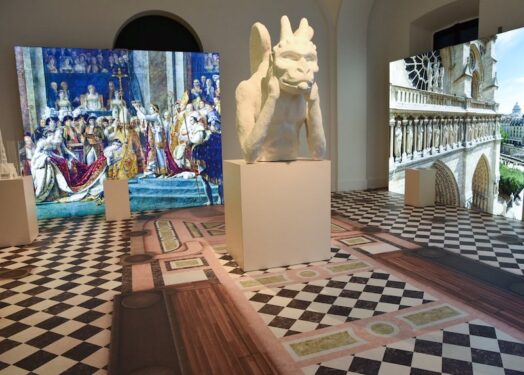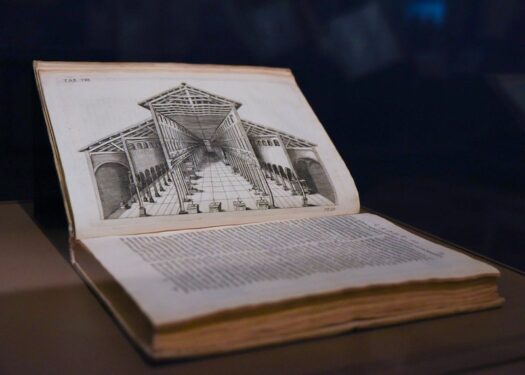By Zoey Mararist
WASHINGTON (CNS) — A swirling image and the sounds of a whirlpool let exhibit visitors know that through the magic of technology, they will soon be transported to a different time and place.

Then, they can gaze at the ceiling or peer into the depths of the famed Parisian Notre Dame Cathedral. Or with a swipe of the screen, they can see what that corner of the church would have looked like hundreds of years ago.
“Notre-Dame de Paris: The Augmented Exhibition” at the National Building Museum is one of two summer exhibits in Washington that delve into the history of a beloved place of worship visited by pilgrims and tourists alike.
At the Museum of the Bible’s “Basilica Sancti Petri: The Transformation of St. Peter’s Basilica,” visitors can see renderings of what the famous church almost looked like, and how it became the celebrated sacred space it is today.
The Notre Dame exhibit calls itself “an augmented reality immersion into the history and restoration of the revered cathedral.”
Upon arrival, visitors are given a tablet, called a HistoPad, and enter a hall decorated with statues, faux stained-glass windows and giant photos of Notre Dame.
The self-guided tour begins with video footage of the devastating fire that tore through the cathedral in 2019. The docent noted that French visitors call it “the wound.”
Then it continues with the cathedral’s beginnings, when Bishop Maurice de Sully in 1163 started tearing down the 500-year-old Cathedral of St. Etienne, which was too small and old for Paris’ needs, and began building Notre Dame in its place.
Scannable portals, much like QR codes, unlock a virtual reality scene where users can see the site as it was then and quickly swipe to see its modern-day appearance.
As users click on glowing points in the image to read more, church bells, clanging hammers, chanting and other sound effects play.

After walking visitors through the entire construction process, momentous scenes in the life of Notre Dame are explored, from its desecration during the French Revolution to the crowning of Napoleon Bonaparte. The final part of the exhibit shows footage of the incredible ongoing cathedral restoration process, with 360-degree, high-definition views.
At the Museum of the Bible, illustrated prints tell the story of the rebuilding of St. Peter’s Basilica. The exhibit is housed in a hall called “Treasures from the Vatican Museums and the Vatican Library.”
Catholic visitors to the museum also may be interested in the “Mystery and Faith: The Shroud of Turin” exhibit, which delves into the artifact believed by some to be the burial clothes of Christ.
St. Peter’s Basilica in Rome was built over the burial place of the apostle Peter by Emperor Constantine I in the fourth century. In the early 16th century, due to its age and poor condition, the basilica was set to be demolished.
The process of rebuilding took many years and many architects had a hand in the project, including Michelangelo and Bernini. The new basilica was consecrated in 1626.
The prints illustrate the different plans for the new basilica, and culminate in an etching of the ultimate St. Peter’s Basilica and square.
The Notre Dame and St. Peter’s Basilica exhibits celebrate these architectural works of art and remind visitors of the dedicated Catholics who worked faithfully to produce and preserve these houses of God.
Editor’s Note: More about these two exhibits can be found online, respectively, at https://www.nbm.org/exhibition/notre-dame-de-paris-the-augmented-exhibition and at https://www.museumofthebible.org/basilica-sancti-petri-the-transformation-of-saint.
Maraist is a staff writer at the Arlington Catholic Herald, newspaper of the Diocese of Arlington, Va.
